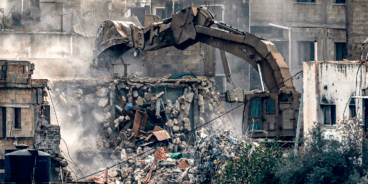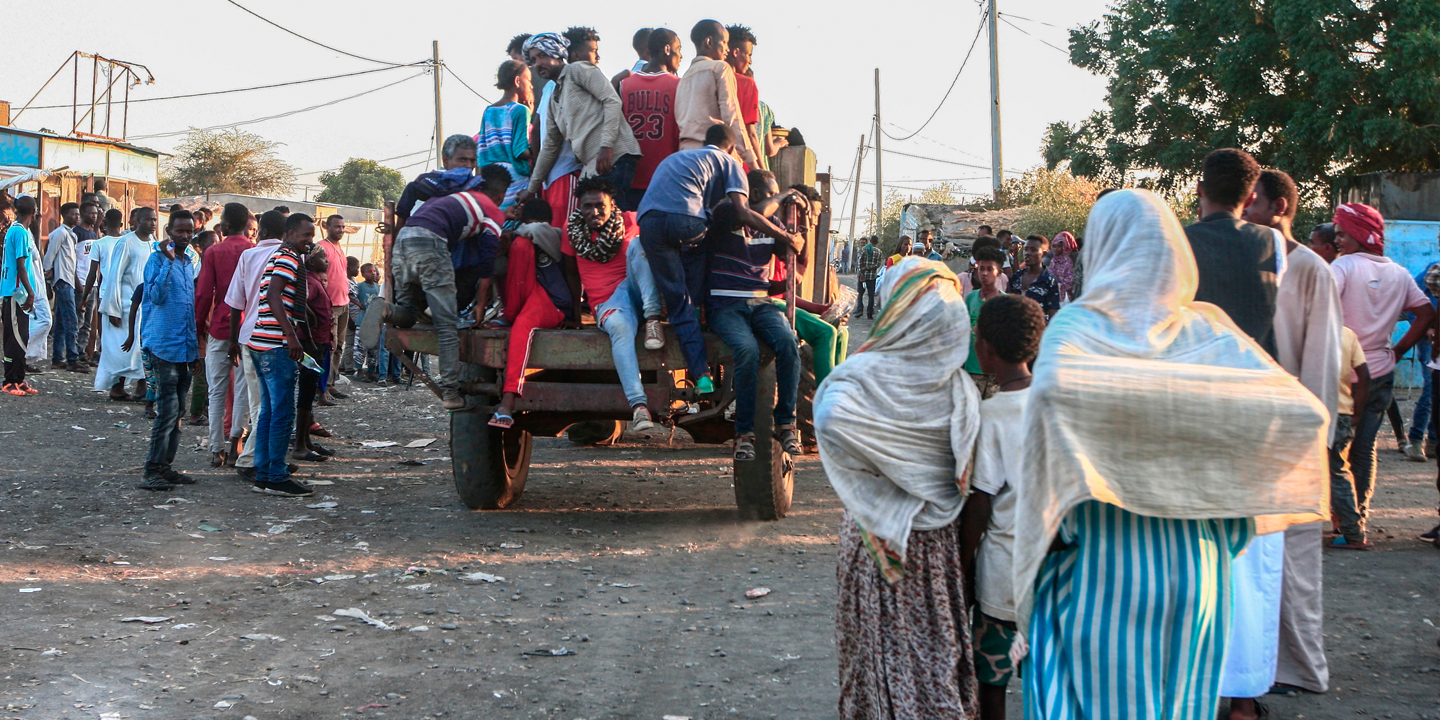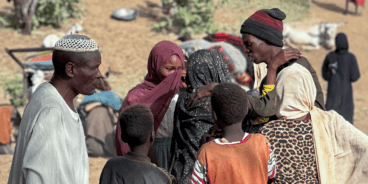

Atrocity Alert No. 229: Ethiopia, Israel and the Occupied Palestinian Territories and Global Landmine Report
Atrocity Alert is a weekly publication by the Global Centre for the Responsibility to Protect highlighting situations where populations are at risk of, or are enduring, mass atrocity crimes.
Reports of atrocities as Ethiopia’s Tigray conflict intensifies
Despite a communications and media blackout in the Tigray region of Ethiopia, reports of war crimes and other violations and abuses of human rights continue to surface. Fighting between the federal government and the Tigray People’s Liberation Front (TPLF) began on 4 November and continues to intensify. Two weeks of armed conflict has led to at least 30,000 refugees fleeing to Sudan and hundreds of people being killed. This includes the likely hundreds of people stabbed or hacked to death on 9 November in the town of Mai-Kadra in the South West Zone of Tigray. Survivors of the attack allege that the TPLF carried out the killings and that most of the victims were ethnically Amhara. Refugees arriving in Sudan have also reported targeted attacks on ethnic Tigrayans by the armed forces.
The TPLF is the ruling party in the northern region and has been in a bitter political conflict with Prime Minister Abiy Ahmed that escalated after the federal government accused the TPLF of holding an illegal regional election and attacking a military base. Despite widespread international calls to end the fighting, Prime Minister Abiy has called for a “final and critical” offensive by the Ethiopian armed forces on Tigray’s capital of Mekelle, possibly placing hundreds of thousands of civilians at risk. Last Saturday the TPLF also fired missiles at Asmara, the capital of neighboring Eritrea, accusing the government of supporting the Ethiopian army’s offensive.
Meanwhile, attacks on the basis of ethnicity are also on the rise elsewhere in the country. According to the Ethiopian Human Rights Commission, on 14 November gunmen killed 34 civilians on a passenger bus in the Metekel Zone, Benishangul-Gumuz region. Multiple attacks in the Metekel Zone, reportedly targeting ethnic Amhara and Agew populations, have resulted in at least 140 civilians killed since September. At least 110 people were also killed in ethnic attacks in Oromia, Afar and Southern Nations, Nationalities and People’s regions during the same time period.
With more than 1.8 million people already displaced as a result of ongoing insecurity, the Ethiopian government must confront the underlying sources of conflict in the country and implement reforms to protect human rights and guarantee equal access to government services and resources. The fighting in Tigray has also cut off critical humanitarian aid to more than 2 million vulnerable civilians.
The Ethiopian armed forces and the TPLF must ensure that all military operations are conducted in strict adherence with international humanitarian and human rights law. Both the federal government and TPLF should call an immediate ceasefire and negotiate a political solution to the crisis. On 12 November the UN Special Advisers on the Prevention of Genocide and the Responsibility to Protect released a statement condemning reports of targeted attacks against civilians based upon their ethnicity or religion and warning if “urgent measures are not immediately taken, the risk of atrocity crimes in Ethiopia remains high.”
Expansion of Israeli settlements violates Geneva Conventions
On 5 November Israeli forces destroyed the Palestinian Bedouin village of Humsa Al Bqai’a – the largest demolition carried out by the Israeli government in a decade. Israeli authorities destroyed more than 83 structures, forcibly displacing approximately 70 Palestinians, including 41 children. The demolition was part of a series of initiatives recently undertaken by Israeli authorities to expand illegal settlements in the Occupied Palestinian Territories (OPT).
According to the UN Office for the Coordination of Humanitarian Affairs, at least 729 Palestinian-owned structures have been demolished or seized by the Israeli authorities so far this year. During October the Israeli government announced the construction of nearly 5,000 new settlement units in the OPT, bringing the total number approved this year to 12,150. On 15 November the Israel Land Authority announced the start of the bidding process for the construction of a new settlement at Givat Hamatos. This settlement, coupled with plans for another settlement in the E1 area, will cut off East Jerusalem from the occupied West Bank.
The UN Special Coordinator for the Middle East Peace Process, Nickolay Mladenov, expressed his concern about the Givat Hamatos announcement, stressing that, “settlement construction is illegal under international law and I call on the authorities to reverse this step.” Israeli settlements violate article 49 of the Fourth Geneva Convention, which prohibits an occupying power from transferring parts of its civilian population into occupied territory. The settlements also amount to de-facto annexation of Palestinian land.
Over the past 50 years, the UN Security Council has adopted more than 30 binding resolutions on Israel’s obligations under the Geneva Conventions and the illegality of such settlements. The UN Special Rapporteur on the situation of human rights in the OPT, Michael Lynk, recently emphasized that, “an entirely new accountability culture is sorely needed by the United Nations to bridge the enormous gap between promise and performance.”
Israel should immediately cease all illegal settlement-related activity. All UN member states should support the ongoing investigation at the International Criminal Court as well as the UN Database of enterprises involved in activities related to illegal settlements.
Latest global landmine report reveals 80% of victims are civilians
Each year, around the world, thousands of civilians are killed or injured by landmines and other explosive weapons. According to the latest Landmine Monitor 2020 report released by the International Campaign to Ban Landmines – Cluster Munition Coalition (ICBL–CMC), during 2019 landmines and explosive remnants of war (ERW) caused casualties in 50 countries, including 36 Parties to the Mine Ban Treaty. The report documented 5,554 casualties from mines/ERW, with civilians accounting for 80 percent of the casualties and children constituting nearly half (43 percent) of all people killed or wounded.
Landmines are inherently indiscriminate. Their presence in civilian areas not only results in physical and psychological trauma, but also hinders access to essential activities, such as agriculture or the delivery of humanitarian aid. Four of the countries with the most landmine and ERW victims in 2019 – Afghanistan, Mali, Yemen, and Nigeria – are also experiencing ongoing atrocity crimes perpetrated against local populations.
As fighting between government forces and the Taliban has surged during 2020, the UN Assistance Mission in Afghanistan has recorded that over 6,000 civilians have been killed or injured, with 29 percent of casualties caused by improvised explosive devices (IEDs), including anti-personnel mines. Children account for 80 percent of the almost 300 civilian causalities caused by ERW so far this year.
At least 200 people have also been killed or injured by landmines and explosive remnants during 2020 in Myanmar, with many casualties occurring in Rakhine state. One third of those killed or wounded are children.
Landmines and IEDs are also a growing feature of armed conflicts in the Central Sahel and Lake Chad regions. In Mali, at least 42 civilians were killed in 82 incidents between January and May this year, mainly in the regions of Mopti, Gao and Kidal. In northeastern Nigeria, at least 230 people were killed by IEDs and 300 injured in 2019. During July the UN Refugee Agency (UNHCR) also called attention to the growing number of refugees and displaced people dying or being injured by landmines or IEDs.
Babar Baloch, UNHCR spokesperson, emphasized that, “urgent efforts are needed to address the dangers and legacy of landmines and to heighten awareness of the horrifying threat from mines, explosive remnants of war and improvised explosive devices.”
All UN member states should rigorously adhere to the Mine Ban Treaty. Comprehensive assistance should be provided to all those harmed by these indiscriminate and illegal weapons, in line with the UN Policy on Mine Victim Assistance.
Related Content


Atrocity Alert No. 435: Sudan, Israel and the Occupied Palestinian Territory and Democratic Republic of the Congo
